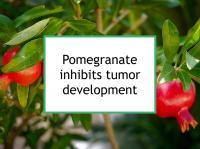Pomegranate fruit and pomegranate extracts have been shown to inhibit proliferation, invasion and angiogenesis (the growth of new blood vessels) in a variety of breast cancer cell types, including hormone receptor positive (ER+/PR+), triple negative (ER-/PR-/HER2-), and HER2 overexpressing (HER2+).
Pomegranate has also been shown to promote apoptosis (programmed cell death) in both ER+ and ER- breast cancer cells in a dose dependent manner, as well as to prevent mammary tumor formation in a mouse model of HER2+ breast cancer.
In addition, pomegranate extract has been shown to inhibit aromatase activity (a process by which androgens are converted to estrogens in the body), as well as enhancing the treatment effects of tamoxifen. Now a new study has uncovered specific signaling-related mechanisms by which dietary pomegranate inhibits tumor development in an animal model of breast cancer.
Latest research explains effects of pomegranate in animal model
The study referenced at the beginning of this news story was designed to examine the mechanism of action by which pomegranate phytochemicals exert a significant chemopreventive effect (as a result of antiproliferative and proapoptotic actions) in an animal model of breast cancer. In particular, the authors sought to investigate the effects of pomegranate on the expression of estrogen receptor ERα, ERβ, β-catenin and cyclin D1 during carcinogen-induced rat mammary carcinogenesis.
To conduct the study, the authors harvested mammary tumor tissue from a previous study in which feeding a pomegranate emulsion at various levels was found to inhibit mammary tumor development and growth in a dose dependent manner. Immunohistochemical techniques were used to assess the expressions of ERα, ERβ, β-catenin and cyclin D1 (a cell growth regulatory protein important for cell cycle progression).
Pomegranate was found to downregulate the expression of ERα and ERβ and lower the ERα to ERβ ratio. Pomegranate also reduced the expression, cytoplasmic accumulation, and nuclear translocation of β-catenin. β-catenin is one of the key components of the Wnt signaling pathway. The Wnt signaling pathway sends β-catenin into the cell nucleus to activate the epithelial-to-mesenchymal cell transitions that cancer cells undergo in the process of becoming capable of metastasis. Inhibition of β-catenin signaling appears to play a central role in the anticancer activity of certain micronutrients.
In addition, pomegranate was found to suppress the expression of cyclin D1, which is a downstream target for both ER and Wnt signaling. The authors conclude that simultaneous disruption of both estrogen receptor and Wnt/β-catenin signaling pathways might explain a portion of the antiproliferative and proapoptotic effects of pomegranate in carcinogen-induced rat mammary tumor development.
Please see our page on pomegranates for more information.
